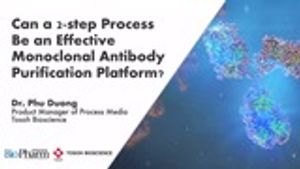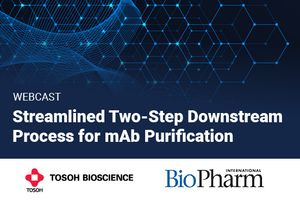Articles by Tosoh Bioscience

Protein A resin is an essential tool used to purify monoclonal antibodies (mAb); however, it can also be the costliest step in downstream bioprocessing. To prolong the lifetime of your protein A resin and therefore reduce operating costs, this performance study showcases a novel protein A resin’s ability to withstand extensive cleaning before experiencing a loss of binding capacity.

Each additional step in monoclonal antibody (mAb) downstream bioprocessing increases operating expenses and reduces the recovery of precious product. This Application Note, demonstrates how Multi-Column Chromatography (MCC), an integral part of continuous biomanufacturing, reduces operating time, buffer consumption, and resin usage, thereby decreasing operating expenses.

Now more than ever, researchers are leveraging the power of monoclonal antibodies (mAbs) to fight life-threatening diseases. To support scientists worldwide in their purification efforts, this Application Note details an example workflow to optimizing purification steps for mAb capture, the most critical step in downstream bioprocessing, using a novel protein A resin.
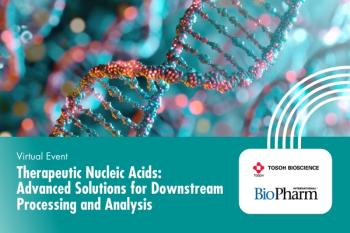
Webinar Date/Time: Wed, Nov 5, 2025 11:00 AM EST
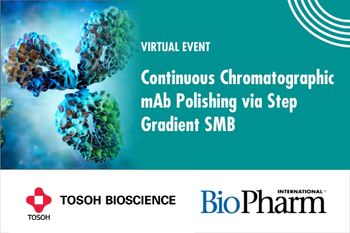
Webinar Date/Time: Tue, Dec 3, 2024
Session 1: 9:00 am EST | 1:00pm GMT | 2:00pm CST
Session 2: 2:00 pm EST| 1:00pm CST| 11am PST
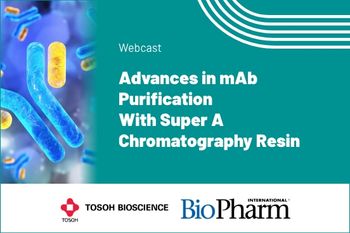
Webinar Date/Time: Thurs, September 19, 2024
Session 1: 9:00am EDT | 1:00pm GMT | 2:00pm CET
Session 2: 1:00pm EDT| 5:00pm GMT | 6:00 am CET

Traditionally, producing biotherapeutics such as monoclonal antibodies required a multi-step process
to remove impurities, including host-cell proteins, DNA, adventitious viruses, and antibody aggregates. However, by
converting the process from batch chromatography to multi-column chromatography (MCC), there is potential to
reduce costs and shorten production times for the capture and purification of high-quality mAbs.

Transitioning to intensified, continuous chromatography can increase efficiencies and decrease time and cost when analyzing protein A.

A two-step mAb purification process was developed, tested, and intensified. Increased process productivity, while exhibiting robust impurity clearance and high yield, was achieved.
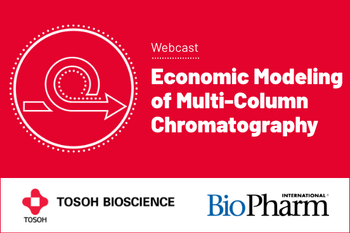
Webinar Date/Time: Tuesday, December 12, 2023
Session 1: 9:00 am EDT | 1:00pm GMT | 2:00pm CET
Session 2: 1:00 pm EDT| 12:00pm CDT| 10:00am PDT

Intensified continuous chromatography, a type of Multi-Column Chromatography (MCC), has emerged as a valuable technique in downstream bioprocessing that enables increases in productivity. In this podcast, MCC Product Specialist, Jennifer Knister, will discuss how adopting MCC can reduce costs, decrease suite time, and lead to higher resin utilization, along with why these benefits are particularly worthwhile in multi-product facilities.
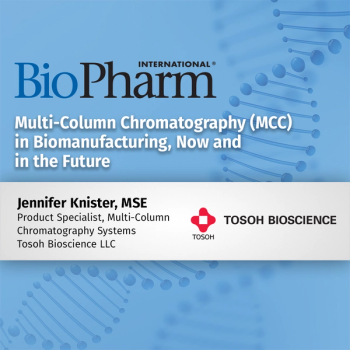
Intensified continuous chromatography, a type of Multi-Column Chromatography (MCC), has emerged as a valuable technique in downstream bioprocessing that enables increases in productivity. In this podcast, MCC Product Specialist, Jennifer Knister, will discuss how adopting MCC can reduce costs, decrease suite time, and lead to higher resin utilization, along with why these benefits are particularly worthwhile in multi-product facilities.

A two-step mAb purification process was developed, tested, and intensified. Increased process productivity, while exhibiting robust impurity clearance and high yield, was achieved.
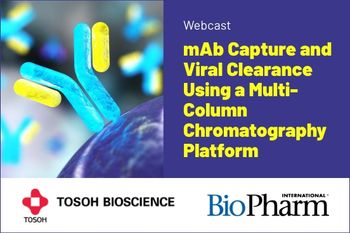
Webinar Date/Time: Tuesday, September 12, 2023

While continuous bioprocessing has been around for decades, it is becoming more attractive as technological advances and new trends in the biopharma industry emerge.

Transferring from a conventional batch mode to a multi-column chromatography (MCC) process significantly increases the productivity of the Fab fragment capture.

A 2-step platform to purify Pertuzumab is developed, using 1 mL and 5 mL pre-packed columns. Then, scale-up is demonstrated using 50 and 200 mL pre-packed columns.
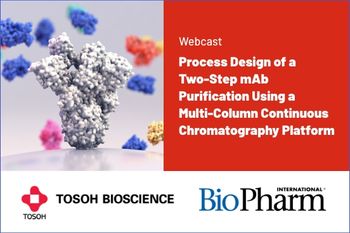
Wednesday, October 26th, 2022
Session 1: 9am EDT|6am PDT|2pm BST|3pm CEST
Session 2: 2pm EDT|11am PDT|7pm BST|8pm CEST
Design and intensify a multi-step mAb purification process with limited investment. Lower the complexity barrier to multi-column continuous chromatography.

Using a pre-packed column platform enables seamless scale-up for downstream process purification. We demonstrate that neither the capacity of the packed resin nor the separation efficiency is affected when increasing the column volume.


Using a pre-packed column platform enables seamless scale-up for downstream process purification. We demonstrate that neither the capacity of the packed resin nor the separation efficiency is affected when increasing the column volume.

Reduce endotoxins in a sample to levels below the limit of detection for a LAL assay with an anion exchange resin in a flow-through chromatography mode.
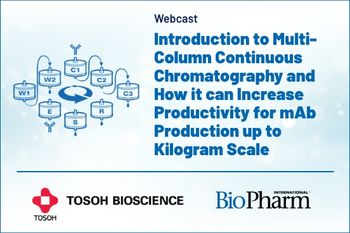
Tuesday, May 17, 2022 at 9 AM EDT|6am PDT|2pm BST|3pm CEST
Tuesday, May 17, 2022 at 2 PM EDT|11am PDT|7pm BST|8pm CEST
Increase productivity and reduce costs for mAb purification. Learn how multi-column continuous chromatography can improve your mAb purification workflow.

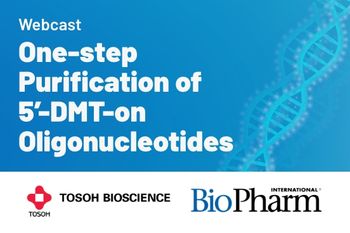
**Wednesday, November 10, 2021 at 11am EST| 8am PST| 4pm GMT| 5pm CET**
Unfold the power of oligonucleotide purification using a hydrophobic interaction resin in one-step chromatography method.
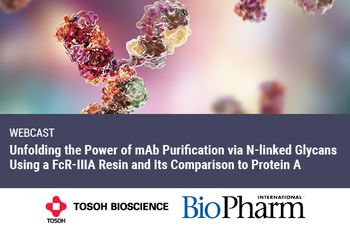
*Wednesday, May 26, 2021 at 11am EDT| 8am PDT| 4pm BST| 5pm CEST* Unfolding the power of mAb purification via N-linked glycans using a FcR-IIIA resin and how it compares to protein A resin. *On Demand Until May 26, 2022*

TOYOPEARL NH2-750F resin is a salt-tolerant AEX resin ideal for the removal of endotoxins in mAb. It works in the presence of 150 mmol/L NaCl and a relatively low pH.
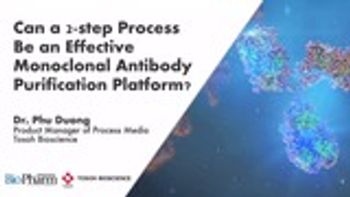

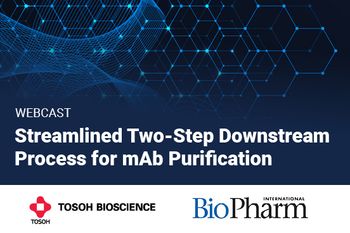
Dr. Jukka Kervinen and Bill Evans will discuss a process optimization protocol and a two-step process for the purification of a mAb.
Wednesday, Sept. 23, 2020 at 11am EDT | 8am PDT | 4pm BST | 5pm CEST
On demand available after final airing until Sept. 23, 2021.













